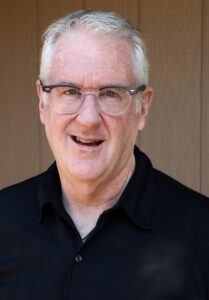
Harvard Takes a Stab at the ‘Coming Spiritual Infrastructure’

Sue Phillips, a former Unitarian Universalist denominational exec and co-founder of the Sacred Design Lab, has written a sort-of “95 Theses” for the technological age and nailed it to the church’s virtual door. In her in-depth Harvard Divinity piece “The Spiritual Infrastructure of the Future,” Phillips tackles the tectonic shifts in religious practice and attendance with this polemic: “While religious communities still need help, as they always have, the solutions being delivered are increasingly unhelpful. At best, there are mismatches between form and function. At worst, the assumptions around which denominational services were built are now mostly out of date.”
To illustrate her premise, Phillips opens her piece with an interesting metaphor, comparing our rutted religious traditions to the odd way American railroads were developed: “The story goes that the first roads in Europe were laid by empire-hungry Romans to serve imperial expansion. Ages of travelers then followed these roads and ruts or risked damaging valuable wagon wheels. The trams and railroads of succeeding generations relied on tools already calibrated to the shape and size of these wheels and axles. The newer U.S. system imported tools and tradespeople from Europe, who did what they knew in the way they knew how to do it, and the rest is history.”
Anyone who’s ever tried to introduce a fundamental change into a church community will already resonate with the railroad metaphor—yesterday I listened as a wizened 25-year veteran of church ministry described her arduous, and so far unsuccessful, four-year effort to move her congregation toward family faith-formation practices. The Roman ruts of ministry keep our wheels anchored, and even a worldwide pandemic shutdown can’t jerk them out of their well-worn norms.
Phillips offers a long list of assumptions about our ministry ruts that are “severely challenged in the religious marketplace of younger generations,” including:
- That religious communities are local, neighborhood-based, and have physical buildings.
- That congregations are the basic unit of denominational membership, and that individuals want to access religious experience through congregations.
- That clergy have a single job, and that it is housed at such congregations.
- That religious leaders are paid enough to support a family and pay off debt from theological education.
- That there’s a pipeline for and surplus of educators, liturgists, and religious professionals, and that they need a denominational hub to find and get jobs.
- That religious identity is transmitted generationally and that beliefs are inherited.
- That age-segregated classroom-style education models work well for spiritual formation.
- That institutional mediation and leadership is essential in religious landscapes.
- That it is desirable for authority to be held by a few on behalf of the whole.
All of this is interesting, for sure, and some of it qualifies as helpful disruption for ministry practices and traditions that we all know are in dire need of a re-birth. But Phillips’ contends that the reasons behind the church’s decades-long “death spiral” don’t really matter. She points to the “usual suspects” behind church-decline stats, including political schisms, abuse scandals, changes in how people access information and experiences all contribute, and the growing mistrust in institutions and authorities. Finally, she concludes: “In a way the causes don’t matter. We don’t have to share the same diagnosis of the causes to observe the unmistakable results…
And this is where I wholeheartedly disagree with her premise.
The forces that seem to be dragging down the church are not rooted in our “what’s;” they’re rooted in our “why’s.” If we don’t understand and respond to the real forces at work behind the church’s current struggles—the why’s behind the what’s—we’re throwing punches in the dark. And, I believe, these “why’s” track back to God’s own agency as He shepherds the multi-layered generations that make up the contemporary church. In contrast to what Phillips calls a “death spiral,” a description that hints at widespread dysfunction in the church’s “business model,” the church is experiencing a pruning. God is exercising agency as a master gardener, and the shears come out when His beloved botany descends into unhealth. In my new book Editing Jesus I offer my own diagnosis of the why’s behind the pruning, and a primary way we can shift to a co-gardening mindset:
While there are many surface ways to explain the mass exodus from the church, the active toxin is much harder to detect. Look closely and you’ll find it lurking in Gen Z’s prophetic indictments (“[The church is] teaching things that aren’t about Jesus; they’re more like TED talks—we don’t want self-help, we want Jesus”). The real source of the church’s troubling decline is not its divisiveness or scandalous behavior or hypocrisy or competitive weakness with other cultural influences—these are symptoms of a deeper issue. A deeper issue that young people already know how to articulate . . .
The driving force propelling the church into irrelevance is its propensity to edit Jesus.
I mean, we cherry-pick what we like about Him, or what we find useful about Him in our worldview, and then discard the rest… And a reduced and redacted Jesus does not inspire worship. We won’t “lose our life to save our life” for a “Divine Butler” or “Cosmic Therapist,” the descriptions researchers give for the edited version of Jesus prevalent in Western culture. Translated, we expect Jesus to emerge from His “servant quarters” when we need Him, and stay out of sight when we don’t. We want Him to fix what’s wrong with us and make us feel better during our scheduled appointment, not live in our house.
When we edit Jesus to conform to our TED Talk sensibilities, or our self-centered expectations, we promote and propagate a twisted version of the Christian life. That, in turn, produces the surface threats to the church—the divisiveness, scandals, hypocrisy, and cultural weakness. Dr. Russell Moore, editor of Christianity Today, captures the threat well in his mid-pandemic address to the New York Bruderhof Society: “If people reject the church because they reject Jesus and the gospel, we should be saddened but not surprised. But what happens when people reject the church because they think we reject Jesus and the gospel? What if people don’t leave the church because they disapprove of Jesus, but because they’ve read the Bible and have come to the conclusion that the church itself would disapprove of Jesus? That’s a crisis.”
Two times in the New Testament we hear the audible voice of God. And each time, in the precious few seconds this booming and completely “other” voice speaks, God emphasizes the same thing: “This is my beloved Son—I’m well-pleased with Him. Listen to Him!” If we’re paying attention we can take three things from this:
- The Kingdom of God is infused with affection,
- Jesus is extraordinary in the way He models the heart of God, and
- Our primary mission in life (and in ministry) is to pay better attention to Him.
And when the church veers from this last priority, the pruning shears come out. Co-gardening with God means we pick up our own pair of shears and start pruning away those “railroad” assumptions that don’t rivet our congregation’s attention on “Listen to Him!”
◊ ◊ ◊
Register NOW for Thursday’s (9/19) FREE Webinar with Princeton’s Dr. Kenda Creasy Dean – “Don’t Start With Why”
Save your seat for our FREE September 19 webinar “Don’t Start With Why,” led by Dr. Kenda Dean, Professor of Youth, Church, and Culture at Princeton Theological Seminary and the author of Almost Christian and many other books. Kenda will guide you through an approach to Christian ministry that is both surprising and affirming at the same time. Despite the popularity of Simon Sinek’s “start with ‘why’” strategy, Kenda’s approach focuses more on what we feel than what we think. And that model for a compassion-driven, grace-drenched version of humanity is Jesus. We are not called to build better churches. We are called to be better humans who reflect God’s love. Join us on Thursday, September 19th, 2022 from 4-5 p.m. EST. Register HERE.
Help Is On the Way!
Fall is on our doorstep, and we innovative, practical resources that will help you infuse your ministry environment with “rich soil” for transformation. Releasing TODAY is our newest resource—The Sacred Stories Project. This multi-media resource offers your people a simple, safe, and “normal” way to share aspects of their story in natural, genuine ways. And you get a more connected, honest, and “known” congregation. It’s four guided sessions with accompanying video segments from Adam Young, trauma counselor and host of the podcast The Place We Find Ourselves. And check out our new resource Listening to Jesus Together. It’s a set of six carefully crafted “listening encounters” designed for three people to experience together—online or in-person. The goal is to give people in your congregation a weekly “reminder habit” to help them listen to Jesus in the context of a short-term small-community experience. Next, Following Jesus is a curriculum resource you can use with both adults and teenagers in your church this fall—help them explore what an ABIDING/REMAINING relationship with Jesus is like. It’s an experiential, highly interactive, co-discovery way to invite people into deeper intimacy with Jesus. And The Life of Jesus TalkCards is a simple, devotional way to invite small groups into the heart of Jesus.
Meanwhile, check out our next Fall MasterClass! Join me as I lead a new two-session MasterClass called The Ministry of Presence: Unlocking Purpose In Your People—Wednesdays, Sept. 25 & Oct. 2. We know from current research into the state of U.S. congregations that many, many people sitting in our sanctuaries are lonely, sometimes dangerously lonely. They are unseen, even in communities of faith that have a mission to connect people in nurturing, faith-forming relationships. So, if we want to create an ecosystem of deeper connections, we’ll need to lean in to the Ministry of Presence—the Jesus-centered art and skill of pursuing people in a way that “unlocks” them. I’ll draw from decades of experience practicing the Ministry of Presence in groups of teenagers and adults, along with the “best practices” of others who are training leaders to seed environments of thriving connection. Register HERE.

Rick Lawrence is Executive Director of Vibrant Faith—he created the new curriculum Following Jesus. He’s editor of the Jesus-Centered Bible and author of 40 books, including his new release Editing Jesus: Confronting the Distorted Faith of the American Church, The Suicide Solution, The Jesus-Centered Life and Jesus-Centered Daily. He hosts the podcast Paying Ridiculous Attention to Jesus.
[activecampaign form=5]

The Sacred Stories Project, a multi-media resource, includes individual guides for a Leader Session and three Participant Sessions—all designed to seed the start of a storytelling culture in your church. The simple goal is to invite members of your congregation into a simple, progressive way to tell the stories of their life. This process has the power to transform your community and open your people to new depth in their relationship with God. Learn More Here



